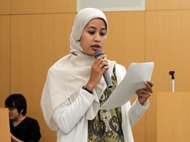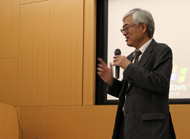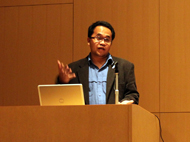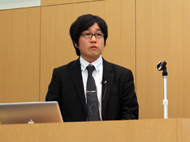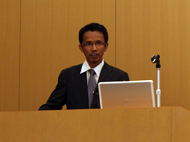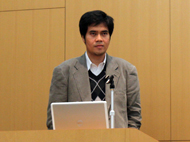Events
GCOE Young Researcher Symposium "Human Security Engineering Issues in Indonesia"
Date: November 11, 2009
Venue: Gloabl Hall JINYU (C1-2), Katsura Campus, Kyoto University
Organized by:
Kyoto University Global COE program "Global Center for Education and Research on Human Security Engineering for Asian Megacities"
Co-organized by:
Support Program for Improving Graduate School Education "Int'tech Fusion Graduate School Engineering Education Program"
Number of attendants: about 25
Poster
Report 075
Outline
The symposium of the Global COE program "Global Center for Education and Research on Human Security Engineering for Asian Megacities" was held at Jin-Yu hall in Katsura campus on November 11th, 2009. The purpose of the symposium was to address and disseminate recent research programs related to human security engineering issues in Indonesia.
Report
The symposium was commenced by Prof. Matsuoka. He delivered an opening remark and gave a brief review of human security issues in Asia, particularly Indonesia. The first presenter was Dr. Andri Dian Nugraha who talked about his recent trip to Tasikmalaya just a week after an earthquake had occurred there. He addressed that in 2009 Indonesia was in a seismically active period since at the time there were a lot of earthquakes occurred in the region. Andri explained Indonesian region that was tectonically very active and volcanism relating to subduction processes. He also mentioned that the Tasikmalaya earthquake had caused several damages. He concluded that his future research would include estimating seismic velocity, attenuation, and thermal structure by applying tomography imaging for the inland fault. The second speaker was Key Oyoshi, Ph.D who talked about remote sensing of heat island effects over Asian megacities. He showed that continuous economic growth in Asian countries could increase urbanization and in anthropogenic energy consumption causing urban heat island effects. The heat island effect increases cooling cost in summer and induces heat-related health problems such as heat stroke. Oyoshi suggested that remotely sensed data could be a powerful tool to characterize urban area and measure urban thermal conditions, because it would be able to capture spatio-temporal variations in urban environments. Finally, he introduced LST database over Asian megacities (Tokyo, Osaka, Beijing, Shanghai, Hanoi, Jakarta, Manila and Bangkok) that he had constructed with MTSAT data. The database has been opened to public online. The third speaker was Dr. Fatkhan who gave a presentation on causes of land subsidence and lowering of groundwater level due to excessive extracting of it. Jakarta's government is not able to provide clean water for its every citizen since the population of Jakarta is continually increasing. Hence to fill short supply of clean water, people usually drill a well to extract groundwater. However excessive extracting of groundwater can cause several problems, such as land subsidence, lowering of groundwater level, and seawater intrusion. He then explained the impact addressed at the early stage so that other environmental hazards could be avoided or reduced. To sum up, he showed a map showing the area of land subsidence and sea water intrusion based on time-lapse microgravity results. The last speaker was Dr. AgyaUtama who explained Indonesia 2050 electricity supply scenarios. He elaborated several problems on predicting the future and its assumptions. Also, he mentioned that there were key assumptions with case study for Indonesia. He suggested that Indonesian government should decentralize its generation of power. This is because Indonesia is an archipelagic country, and therefore to increase small capacity of coal and natural gas power plants.
